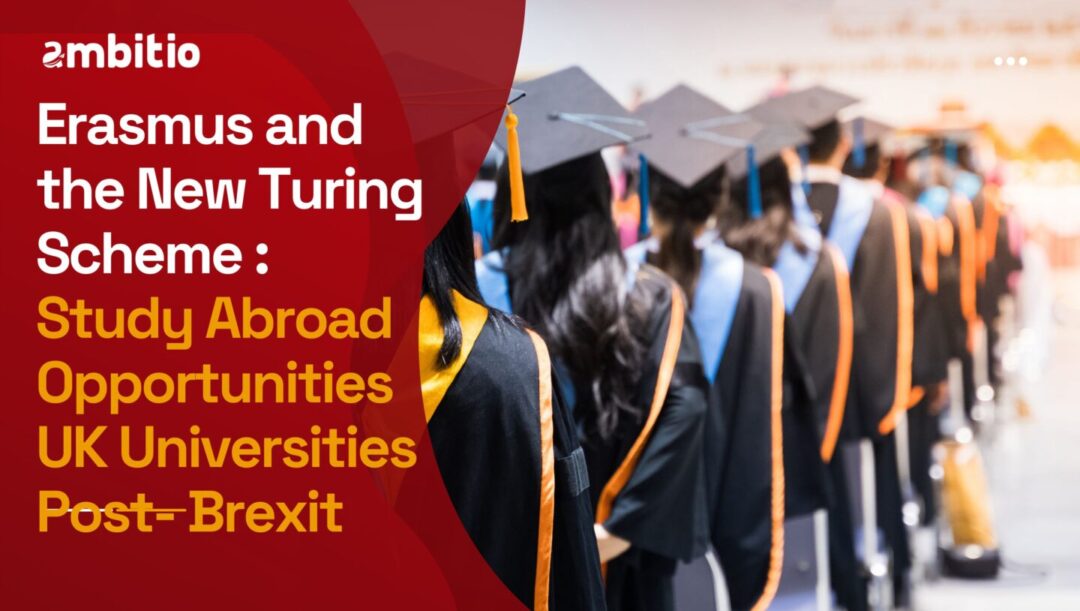1 September 2024
9 minutes read
Erasmus and the New Turing Scheme: Navigating Study Abroad Opportunities at UK Universities Post-Brexit

Key Takeaways
- Erasmus enhances academic opportunities across the EU.
- Turing expands horizons globally, not just in Europe.
- Brexit necessitates new agreements for UK participation in Erasmus.
- Financial support is crucial for equitable access to these programs.
- Language proficiency remains a barrier and an opportunity for students.
Introduction
Given Brexit and the post-Brexit educational landscape, these aforementioned exchange programs introduce prospective possibilities for British students to expand their academic and cultural borders. This paper examines how s operate to enable study abroad, highlighting manifest improvements in mobility, educational collaboration, and difficult movements between policy and its aftermath following Brexit.
What is the Erasmus Exchange Program?
The Erasmus Exchange Program is a prestigious educational feature to support academic migration in Europe. The program aims to provide student exchanges at universities holding the Erasmus Charter for Higher Education to develop European cooperation and promote student learning and self-development. The main peculiarities include the following:
- Participating Institutions
- Possibility to apply for a university from a wide network of European institutions to consider the best specialization and academic traditions.
- Program Duration:
- Students usually take part in the program from the second study year, from one term to the whole academic year.
- Academic Credits:
- Collect credit points are fully transferable and will be calculated upon the European Credit System for Archived Learning.
What are the Requirements to Participate in the Program?
To successfully participate in an exchange, the participants must comply with the following conditions:
- Enrollment status: Should be currently enrolled in a higher education institution that has a valid Erasmus Charter.
- Academic level: It is recommended for participants to be in at least their second year of studies to adequately and successfully meet the academic standards of a foreign educational system.
- Language requirement: students may be required to demonstrate language fluency in the country and language of the host institution or through standardized tests or institutional exams.
What are the Benefits of Participating in the Program?
Participating in the Erasmus Exchange Program presents several benefits beyond studying:
- Academic Enrichment:
- Participate in lectures and seminars in leading European academic institutions to learn different perspectives in your field of study.
- Language Skills:
- Learn new languages through immersion, useful in personal and professional pursuits.
- Professional Development:
- Create a network of both fellow students and professionals across Europe. This network may help you land a future job.
- Cultural Exposure:
- Daily life in another nation helps one experience diverse cultures more thoroughly and expand worldview.
How Does the Turing Scheme Compare to the Erasmus Exchange Program?
After the UK left the EU, a large program was replaced with its own UK version, called the Turing to offer some aspects. This global approach to educational exchange offers several factors when compared:
- Global Reach:
- The opportunity to study not just in EU countries, but worldwide, helps to gain more cultural and academic experience.
- Flexibility:
- Allows for more flexibility by offering short-term placements, which may be more attractive for students who are unable to leave for a semester or a year.
- Funding:
- Offers travel grants for living expenses, travel, and tuition fees. Though the general practice is almost the same as the Erasmus program offers, the conditions and amount may change.
FACT
Global Reach of Turing: The Turing aims to support 35,000 UK students in global study opportunities each year
What Impact Will Brexit Have on the Erasmus Exchange Program?
The most critical implications of the European Union for the UK in the Erasmus program are the following.
- Access:
- UK students and universities no longer have automatic access to Erasmus grants or mobility opportunities.
- Partnerships:
- UK institutions may establish bilateral agreements or negotiating partnerships with European universities to ensure students and staff have access to a negotiated program.
- Funding Alternatives:
- universities and students must find alternative funding sources, such as Turing, to encourage international student and staff mobility.
How to Take Part in the Erasmus Exchange Program?
Enrolling in the Erasmus Exchange Program is a thrilling opportunity for students to expand their academic and cultural experiences. Below is a step-by-step guide on how to get started with this life-changing journey:
- Check Eligibility: You should be currently enrolled in a home university with an Erasmus Charter for Higher Education. This gives you access to international partner universities across Europe.
- Academic Requirements: The minimum requirement is being in your second undergraduate year. You can also study at the master’s or Ph.D. level. Additionally, your academic record should meet the minimum requirements of your home and the institution of your choice.
- Consultation: Talk to the Erasmus coordinator at the university or college you attend. Alternatively, speak with the international advisor in your institution. They will tell you more about the academic years’ duration, and study areas and give a list of the universities to which you can defer.
- Choose a University: Consider your language skills, study areas that may differ in European countries, and your personal preferences.
- Application Process: Submit your application through the international office of your home college. You may need to write a cover letter.
- Documentation: You may also need a learning agreement, official language certificate, academic credentials, and authorization from both universities to get an agreement.
- Visa and Travel: If you are going to a non-EU country, you may also need a visa. Apply for a student or exchange visa which is hard to obtain. This way, you will get enough time for the procedure.
What are the English Language Requirements for Participating in the Program?
Competencies in English are a must-have for entering the Erasmus program, especially if you are going to study in countries with different official languages:
- Language compatibility:
- United European universities and colleges on the Common European Framework of Reference of Languages, and most European universities require a B2 level of the English language.
- Certification:
- Provide your language level through international IELTS or TOEFL testing, or it can be conducted the tests by your university before participation.
What is the Process for Applying for the Program?
Application for participation in the Erasmus program should be structured into the following steps that would help to smoothly prepare for a student’s study abroad:
- University selection: Identify compatible partner institutions for academic and personal interests;
- Learning agreement: Develop a learning agreement to understand exactly which courses a student is going to take and how many credits of they will be recognized by a home university;
- Documentation: Collect and submit the necessary documentation – these are the academic certificate, language certificate, and the other submitted to the international office of a home university and a duly completed application form;
- Approval: After that, it’s necessary to wait and make sure that both home and host institutions will confirm the course selection load and the agreed study period boycott.
What Are the Available Study Abroad Opportunities Through the Erasmus Exchange Program?
Erasmus offers a wide variety of study abroad programs: Wide Range of Disciplines: Erasmus has partnerships with a variety of disciplines based on the arts, sciences, engineering, or the humanities.
- Flexible Study Periods:
- Opportunity includes the following; summer schools, one-semester exchange, full academic year abroad.
- Enhanced Learning Experiences:
- Riter explained that internships and traineeships are part of the Erasmus exchange program.
- Cultural Immersion:
- The Erasmus program allows you to live and study in other European countries. It is the best program that provides an opportunity for students to engage in cultural experiences, and students have an excellent benefit from the international network.
What Are the Tuition and Living Costs for Students Participating in the Program?
Understanding the financial aspects of participating in the Erasmus exchange program is crucial for students planning to study abroad. Here are the key points concerning tuition and living expenses:
- Tuition Fees: Generally, students participating in the Erasmus program do not pay additional tuition fees to the host university. Instead, they continue to pay their usual tuition fees to their home university. This arrangement is part of the Erasmus exchange agreement between partner institutions across Europe.
- Living Costs: Living expenses can vary significantly depending on the host country. Countries in Northern and Western Europe tend to have higher living costs compared to those in Southern and Eastern Europe. Students should budget for accommodation, food, travel, and leisure activities.
- Additional Costs: Other expenses might include visa application fees (for non-EU destinations), travel insurance, and any required vaccinations or health checks.
What Financial Support is Available for Students from Disadvantaged Backgrounds?
The Erasmus exchange program is highly inclusive and accessible for students from all types of backgrounds, which is demonstrated by the following types of financial aid:
- Erasmus grants.
- Erasmus provides grants that contribute towards the costs of travel and accommodation in the host country. The grants vary in size and depend on the length of the stay, as well as the cost of living in the host country.
- Supplemental grants to a disadvantaged student.
- Some supplements specifically are aimed at disadvantaged students to cover additional costs for having a disability or living below the income threshold.
- Partner university grants:
- Host universities might be offering students additional funds, some institutions offer meals, accommodation for free or with a significant reduction, and even scholarships.
FACT
Brexit’s Educational Impact: Post-Brexit, the UK opted out of Erasmus, impacting over 15,000 UK students who participated annually
How Will Brexit Affect Tuition Fees for UK Students Participating in the Erasmus Exchange Program?
The UK students taking part in the Erasmus exchange program will face the following changes after UK leaves the EU:
- Fees for international students:
- Since the UK left the EU, students from the UK will have a similar status to non-EU students in European universities, which means that they will also have to pay more for tuition at foreign institutions.
- Loss of funding:
- British students may lose grants that cover the costs of accommodation and meals when studying abroad.
- New agreements:
- The UK government and the universities may sign new agreements with partner universities in Europe to help students participate, which may earn them discounted tuition fees and other perks.
Schedule Your Expert Call Now:
Ready to navigate the college application process with ease? Schedule a call with our mentor at your convenience. We’re here to offer personalized solutions and expert guidance.
What Opportunities Are Available for Students Through the New Scheme?
The UK government has introduced part of its post-Brexit education strategy the Turing, which is an unmatched opportunity to expand the horizons of UK students globally. Some of what they encompass are:
- Global Study Opportunities: While the Erasmus program was more focused on Europe, the new scheme expanded the horizons to include many continents, such as Asia, the Americas, and Australia.
- Work Placements: Although studies are important, unlike Erasmus, support work placements and internships, allowing students to find practical experience and improve their employability.
- All Academic Fields: Unlike the Erasmus program, which was established for audio-visual and arts-related studies, supports all possible academic disciplines ranging from arts and humanities to sciences and engineering, among others.
- Accessibility: The Terra must be inclusive and support travel costs, living expenses, and tuition fees, making it accessible to those from disadvantaged backgrounds.
What Are the Requirements for Participating in the Turing?
The minimum eligibility requirements to participate in the Turing are:
- Enrollment: To participate in the New Turing Scheme, a student must be enrolled in an undergraduate, postgraduate, or vocational course at the respective UK higher education institution.
- Academic Requirements: Students must be in an excellent academic situation to provide an academic life during travel.
- Commitment to the full-time: Depending on the opportunity that a student wants to enjoy, irrespective of the term, students might have to dedicate their full academic term or year to experience a complete educational journey.
What Are the Differences Between the Turing and the Erasmus Exchange Program?
| Parameter | Turing Scheme | Erasmus Exchange Program |
|---|---|---|
| Geographical Reach | Offers global opportunities, including non-EU countries. | Primarily focused on EU countries and a few associated non-EU countries. |
| Reciprocity | Does not require reciprocal agreements between institutions. | Operates on a reciprocity basis, requiring mutual agreements between participating institutions. |
| Funding Model | Provides inclusive funding that covers travel, living expenses, and tuition, aiming to support a broader range of students including those from disadvantaged backgrounds. | Offers grants mainly aimed at covering living costs and travel expenses; funding levels can vary based on the host country’s cost of living. |
| Program Scope | Includes provisions for both study and work placements across various disciplines globally. | Primarily supports study opportunities, with some options for traineeships within Europe. |
| Participation Requirements | Open to students at UK higher education institutions across all levels of higher education. | Require students to be enrolled in institutions holding an Erasmus Charter for Higher Education, primarily in EU member states. |
| Return on Investment | Potentially higher due to broader international exposure and work placements which can enhance employability in a global job market. | Strong, especially in Europe, due to established networks and partnerships that can lead to future opportunities within the EU. |
| University Offering | Participating universities are globally distributed, providing a diverse range of academic and cultural environments. | Limited to universities with an Erasmus Charter, which are predominantly located within the EU and associated countries, offering a focused but comprehensive European educational experience. |
Conclusion
The dynamic shifts in international educational programs such as Erasmus and the Turing represent a transformative era for UK universities and their students. With opportunities sprawling across global landscapes and challenges like Brexit reshaping participation frameworks, the adaptability and resilience of these programs continue to enrich educational trajectories, fostering global citizens equipped for diverse environments.
Schedule Your Expert Call Now:
Ready to navigate the college application process with ease? Schedule a call with our mentor at your convenience. We’re here to offer personalized solutions and expert guidance.
How can UK universities participate in the Erasmus program post-Brexit?
Through individual agreements with EU institutions, bypassing the traditional collective EU framework.
What differentiates the Turing from the Erasmus Exchange Programme?
The Turing offers global exposure beyond Europe, whereas Erasmus is traditionally EU-centric.
What are the benefits of the Erasmus program for international students in the UK?
It offers international students at UK universities the chance to study in EU member states, enhancing cross-cultural competencies.
How does the Turing support students from disadvantaged backgrounds?
It provides targeted financial aid to ensure equitable access to global study opportunities.
Are there language requirements for participating in the Erasmus program?
Yes, proficiency in the host country’s language or a strong command of English is often required.
What are the academic benefits of participating in the Turing?
It allows students to gain unique insights and experience from institutions worldwide, enhancing their educational portfolio.
How does Brexit affect the funding of the Erasmus program for UK students?
UK students are no longer eligible for Erasmus funding, necessitating alternative funding through UK or third-country.
Can EU students still participate in Erasmus exchanges with the UK?
Yes, but it depends on individual agreements between their home institutions and UK universities.

You can study at top universities worldwide!
Get expert tips and tricks to get into top universities with a free expert session.
Book Your Free 30-Minute Session Now! Book a call now




























